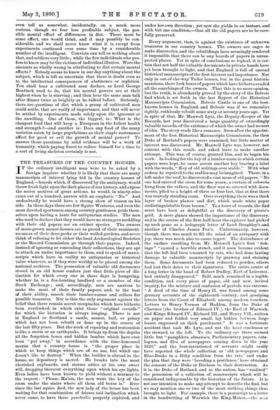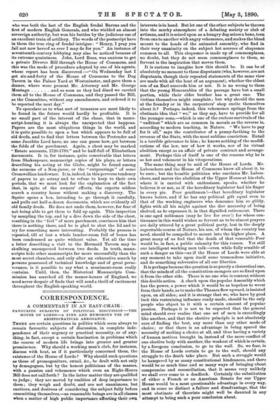THE TREASURES OF THE COUNTRY HOUSES.
IF the ordinary intelligent man were to be asked by a foreign inquirer whether it is likely that there are many manuscripts of interest lying hid in the country houses of England,—hoards which, if discovered by the antiquary, would throw fresh light upon the dark places of our history, and expose the secret motives of great actions, he would, in ninety-nine cases out of a hundred, answer with an emphatic " No." And undoubtedly he would have a strong show of reason on his side., -In these days there are few Squire Westerns, and even the most devoted sportsmen among country gentlemen pride them- selves upon having a taste for antiquarian studies. The men who used to declare that they would have no strangers meddling with their old papers are an extinct species. The owners of moss-grown manor-houses are as proud of their muniment- rooms as of their deer-parks or their walled gardens, and never think of refusing to let either the local Archaeological Societies or the Record Commission go through their papers. Indeed, instead of ignoring or concealing their collections, they are apt to attach an undue importance to them, and to speak of mann- _scripts which have in reality no antiquarian or historical value whatever, as if they were worthy to be placed among the national archives. The possession of valuable old documents stored in an old house confers just that little piece of dis- tinction for which every one in these days is hungering, whether he is a fox-hunting landlord or a member of the Stock Exchange ; and, accordingly, men are anxious to make the most of their family papers, and, to the best of their ability, search their lumber-rooms and cellars for possible treasures. Nor is this the only argument against the belief that there remain secret receptacles which have hitherto been overlooked, in which exist those " original records" for which the historian is always longing. There is not in England or Scotland a castle, manor, hall, or priory which has not been rebuilt or done up in the course of the last fifty years. But the work of repairing and restoration is like a storm or an earthquake. It brings up from the depths all the forgotten boxes and hidden lumber which have ever been " put away," in accordance with the time-honoured maxim that a country house is " the proper place in which to keep things which are of no use, but which one doesn't like to destroy." When the builder is abroad in the house, no depository is sacred. He breaks into the most cherished cupboards, and storms attics at his own sweet will, dragging thereout everything upon which his eye lights. Even ladies have been known to yield without a murmur to the request: " Please, Ma'am, the men want the key of the room under the stairs where all them old boxes is." Ever since the last squire died, the new lady of the house has been waiting for that combination of leisure and inclination which never came, to have these penetralia properly explored, and
under her own direction ; yet now she yields in an instant, and with but one condition,—that all the old papers are to be care- fully preserved.
Every argument, then, is against the existence of unknown treasures in our country houses. The owners are eager to make discoveries, and the rebuildings have seemingly rendered it impossible that there can be any hoards of papers in unsus- pected places. Yet in spite of conclusions so logical, it is cer- tain that not half the valuable documents in private hands have yet been brought to light, and that England is full of unread historical manuscripts of the first interest and importance. Not only in out-of-the-way Tudor houses, but in the great historic mansions, there lurk boxes of papers which have hitherto evaded all the searchings of the owners. That this is no mere opinion, but the truth, is abundantly proved by the story of the Belvoir find which is set forth in the last Report of the Historical Manuscripts Commission. Belvoir Castle is one of the best- known houses in England, and Belvoir was, if we remember rightly, ruthlessly rebuilt some sixty or seventy years ago. Yet in spite of that, Mr. Maxwell Lyte, the Deputy-Keeper of the Records, last year discovered a large quantity of exceedingly valuable records, of the existence of which the owner had no sort of idea. The story reads like a romance. Soon after the appoint- ment of the first Historical Manuscripts Commission, the then Duke of Rutland's papers were examined, but little matter of interest was discovered. Mr. Maxwell Lyte was, however, not content with this result, and asked leave to make another attempt. This was, of course, granted him, and he began his work. In looking for the key of a lumber-room in which certain papers were kept, he came across another key bearing a label with the words, " Key of old writings over stable." With what ardour he repaired to the stables may be imagined. There, in a loft under the roof, he discovered a vast mass of old papers. " No one had entered the room for some years ; a curtain of cobwebs hung from the rafters, and the floor was so covered with docu- ments, piled to a height of three or four feet, that at first there was scarcely standing room. Over everything there was a thick layer of broken plaster and dirt, which made white paper undistinguishable from brown." To a lover of records, the find must have been as delightful as the discovery of pirate's gold. A mere glance showed the importance of the discovery, and in the course of the first half-hour the explorer had picked up such gems as a holograph letter of Lord Burghley's and another of Charles James Fox's. Unfortunately, however, though there was much to fill the mind of an antiquary with joy, there was much also to cause regret. The disturbance of the surface resulting from Mr. Maxwell Lyte's first " fish- ings " "caused a horrible stench, and it soon became evident that the loft had been tenanted by rats, who had done lasting damage to valuable manuscripts by gnawing and staining them. Some documents had been reduced to powder, others had lost their dates or their signatures. The entire centre of a long letter in the hand of Robert Dudley, Earl of Leicester, had entirely disappeared." Still, much remained in a legible condition, and every piece of paper, old and new, invited inquiry, for the mixture and confusion of periods was extreme. " A deed of the time of Henry II. was found among some granary accounts of the eighteenth century, and gossiping letters from the Court of Elizabeth among modern vouchers. Letters to Henry Vernon of Haddon, from the Duke of Clarence [the brother of Edward IV.], the Earl of Warwick, and Kings Edward IV., Richard III., and Henry VII., written on paper and folded very small, lay hidden between large leases engrossed on thick parchment." It was a fortunate accident that took Mr. Lyte, and not the head coachman or the steward, to the loft. To the ordinary eye there seemed little but " pamphlets, almanacs, Parliamentary papers, cata- logues, and files of newspapers coming down to the year 1820," and the best-intentioned of servants might easily have reported the whole collection as old newspapers and Blue-Books in a filthy condition from the rats,' and under the plea that they were breeding a pestilence,' have obtained the consent of the Duke or Duchess to their destruction. As it is, the Duke of Rutland, and so the nation, has " realised" the possession of a collection of manuscripts which will be considered indispensable by the historian of the future. It is not our intention to make any attempt to describe the find, but we may mention one or two of the most striking things thus brought to light. For example, there is a postscript to a letter in the handwriting of Warwick the King-Maker,—the man
who was both the last of the English feudal Barons and the first of modern English Generals, and who wielded an almost sovereign authority, but won his battles by the judicious use of an excellent train of artillery. The words of the postscript have in them the true ring of feudal intrigue : " Henry, I pray you fail not now hereof as ever I may do for you." An instance of seventeenth-century lobbying may also be noticed because of its extreme quaintness. John, Lord Roos, was anxious to get a private Divorce Bill through the House of Commons, and this was the mode of procedure adopted by one of his agents, whose report has been discovered :—" On Wednesday last I got six-and-forty of the House of Commons to the Dog Tavern in the Palace Yard at Westminster, and gave them a dinner, where were present Mr. Attorney and Mr. George Montagu and as soon as they had dined we carried them all to the House of Commons, and they passed the Bill, as the Committee, without any amendments, and ordered it to be reported the next day."
To speculate as to what sort of treasures are most likely to be found in the future would hardly be profitable. It is no small part of the interest of the chase, that in manu- script-hunting it is always the unexpected that happens. Papers are the most ubiquitous things in the world, and it is quite possible to open a box which appears to be full of old deeds, and to find that letters between the Pretender and some Jacobite Lord have, no one can guess how, got between the folds of the parchment. Again, a chest may be marked "Estate accounts, 1720-1780," and be half-fall of Elizabethan documents. It is, for instance, quite conceivable that letters from Shakespeare, manuscript copies of his plays, or letters describing his acting at the Globe, might be found among the sermons of a Non-juror, or the " outpourings " of some Cromwellian landowner. It is, indeed, in this perverse tendency of papers to go astray and to refuse to keep to their own periods, that we must look for the explanation of the fact that, in spite of the owners' efforts, the experts seldom search a country house without making a discovery. The Squire opens a box, intending to go through it carefully, and pulls out half-a-dozen documents, which are evidently all old family deeds. He does not undo them, however, for fear of not being able to get them to fold up again. This inspection by sampling the top, and by a dive down the side of the chest, resulting in the " feel " of more parchment, convinces him that there is nothing there, and he is glad to shut the lid and to try for something more interesting. Probably the process is repeated, till at last a whole lumber-room full of boxes has been condemned as quite without value. Yet all the time a letter describing a visit to the Mermaid Tavern may be skulking unsuspected between two deeds. In truth, manu- scripts hide other manuscripts far more successfully than the most secret chambers, and only after an exhaustive search by persons possessed of technical knowledge and of great perse- verance, is it possible to say what a muniment-room really contains. -Until, then, the Historical Manuscripts Com- mission has searched all the manor-houses of England, we need never despair of finds that will send a thrill of excitement throughout the English-speaking world.







































 Previous page
Previous page